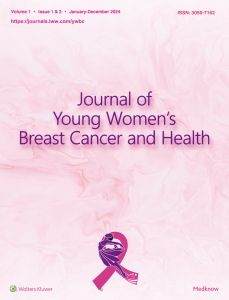
New Research Suggests Distinct Circulating Immune Cell Patterns in Younger Women with Breast Cancer
Exploring Age-Related Differences in Immune Profiles and Their Potential for Personalized Breast Cancer Treatments
DENVER, CO, UNITED STATES, November 25, 2024 /EINPresswire.com/ -- A recent study has revealed distinct immune cell profiles in younger women under 40 diagnosed with breast cancer (BCYW), offering a renewed possibility of age-associated influences in immune system dynamics and cancer progression. Upon further advancement of these findings, this research might pave the way for tailored treatments and improved predictions for younger women battling this aggressive disease.Breast cancer in younger women is often diagnosed at advanced stages. It tends to involve more aggressive subtypes, such as triple-negative or HER2-positive cancers, which are less responsive to hormone therapies. Some of these cases will also progress to metastatic breast cancer, highlighting the need for tailored therapeutic strategies.
The study, led by Abreu et al. and published in the Journal of Young Women's Breast Cancer and Health, explored the baseline immune cell profiles of younger women with Metastatic Breast Cancer (MBC) compared to women aged 40 and older. It also examined differences based on menopausal status, cancer subtypes, and the extent of metastasis. Researchers focused on understanding the relationship between immune cell dynamics, age, and cancer outcomes.
EXAMPLES OF KEY OBSERVATIONS
• Younger patients exhibited higher levels of effector immune cells and less memory and regulatory T cells than older patients.
• This immune profile correlated with a more activated immune response, regardless of metastasis.
• Regulatory T cells, known to suppress immune responses and support tumor growth, were less common in younger women.
• Older women showed increased memory T cells, which could contribute to long-term anti-tumor immunity.
"Regardless of metastatic burden, menopausal status, or molecular subtype, younger age is associated with a distinct immunologic profile characterized by higher effector activity and lower levels of regulatory and memory cells," the authors noted.
POTENTIAL IMPLICATIONS
The findings suggest a potential for developing immunologic predictive tools, liquid biopsy-based, to improve disease progression predictions and assist in developing personalized therapies for younger women. While the findings are promising, the study acknowledges limitations, including its small sample size of 17 BCYW cases and the need further to explore the complex interactions between immune cells and tumors.
IN BRIEF
This study underscores the importance of considering age-related immune differences in breast cancer and suggests further research into immunologic approaches for treating younger women.
Rakesh Kumar, Ph.D., Founder and CEO
Breast Cancer in Young Women Foundation
bcywf@breastcancerinyoungwomen.org
Visit us on social media:
Facebook
X
LinkedIn
Instagram
YouTube
Distribution channels: Culture, Society & Lifestyle, Education, Healthcare & Pharmaceuticals Industry, International Organizations, Social Media
Legal Disclaimer:
EIN Presswire provides this news content "as is" without warranty of any kind. We do not accept any responsibility or liability for the accuracy, content, images, videos, licenses, completeness, legality, or reliability of the information contained in this article. If you have any complaints or copyright issues related to this article, kindly contact the author above.
Submit your press release

